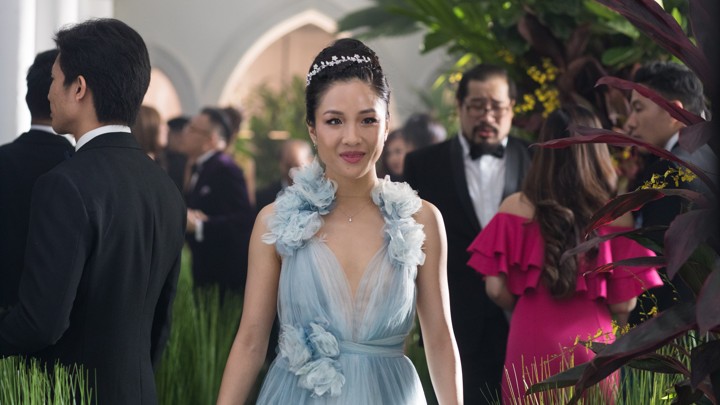
Last week, my cousin and I walked into a movie theatre alongside a crowd of various ages and races to embark on a two-hour journey together watching “Crazy Rich Asians,” John M. Chu’s film adaptation of a novel by Kevin Kwan.
The plot centers around the love story of Rachel Chu (Constance Wu), a Chinese-American immigrant and NYU economics professor, and Nick Young (Henry Golding), the “Prince Harry of Asia.” The two travel to Nick’s homeland of Singapore for his best friend’s wedding, where Rachel discovers that his family is extravagantly wealthy. Thrust into this gilded world, she must deal with cultural differences, snobby socialites, and disapproving family members.
I was excited in the days leading up to viewing the film—you can’t go wrong with some good romantic comedy, all-Asian representation and Henry Golding (that accent!)—but I wasn’t expecting to walk away with anything beyond some satisfactory entertainment. However, I left the theatre feeling euphoric, riding the high of the two-hour emotional experience. I had laughed, cried (six times!), and felt every other emotion in between. From the second the film started, the vibrant energy captivated me, and a smile was instantaneously brought to my face – and still hasn’t left.
While some of these emotions stemmed from the impeccable acting and beautiful storylines, much of it had to do with how recognized and reflected I felt on a big screen. Since I’m not Chinese, but in fact an Indian-American teenager, this may seem surprising. While I technically fall under the same umbrella of “Asian,” I come from an entirely different amalgamation of cultural experiences that have made me who I am. Yet, I couldn’t help feeling my heart swell with pride and acceptance, in a way that no Hollywood movie has ever made me feel before.
Despite explicit differences in the culture depicted and my own, I also noticed a significant amount of overlap. From the (sometimes too) powerful parent-child bond to the clash between Eastern and Western views on the role of a wife, to the frustration when society tries to fit you into the box of a single culture, the relatability shook me to my core. It wasn’t until leaving the theatre that I realized how distant I had felt from all other popular forms of media. I breathed a sigh of relief after finally seeing situations I could empathize with playing out in front of me – and I didn’t even realize I was holding my breath.
Later, when reading articles on the movie online, I hoped other people would be able to articulate the warmth I was feeling and help me understand why I felt so much fulfillment out of this film.
Instead, I was met with headlines like “Is ‘Crazy Rich Asians’ Asian enough?” and “For some viewers, Crazy Rich Asians is not Asian enough.” One subreddit advocated a boycott of the film due to poor representation of the Asian community and believing that it only showed one type of Asian (specifically Chinese-Americans and affluent Singaporeans, thus discounting others). Angry comments about the only brown representation being the Young family’s guards were left on the movie’s official social media channels. Amidst the plethora of positive media surrounding the film, I saw a sea of people focusing on what it did wrong rather than right.
Due to the lack of representation in media, when a diverse film such as “Crazy Rich Asians” comes out, we hold it to such high standards, always expecting perfection and nothing less. We never expect a white-dominated film to encapsulate every single experience of their culture or check off every possible social justice box, yet continue to enforce a harsh double standard on films led by people of color.
A Buzzfeed article discussed this idea of these impossible expectations we create, referencing CRA and Netflix film “To All The Boys I’ve Loved Before” that features an Asian-American lead, saying,
“They’re movies that aim not to break open forms or to reimagine storytelling, but to simply put Asian American characters front and center and declare, counter to years of showbiz bias, that they are compelling, endearing, desirable, and worthy of audience attention by themselves.”
Despite these impossible expectations, lead actress Constance Wu, eloquently addressed the criticism, affirming that she knows the film will not represent every Asian-American. In an interview with US Weekly, Wu stated,
“We can only hope that this opens the door for different kinds of Asian-American stories, and stories from Asians who grew up in countries where they’re not the dominant culture, so they don’t see their faces reflected in pop culture.”
Every single person deserves the feeling of having stories shared about them and their culture. I can only imagine the exhilaration I would feel if a Hollywood film of this caliber came out about Indian-Americans. However, as much as we want it to, we cannot expect the industry to change overnight. By supporting films like “Crazy Rich Asians,” we will gradually shift the norm, and hopefully, encourage Hollywood to make films that reflect all members of the society.
Having this story told may kick down the door for other stories to be told, enabling us to be okay with not having all narratives addressed within a single flick. “Crazy Rich Asians” is the kind of film we need in order to get more of the kinds of films we want. One movie cannot and will not be the saving grace for all issues with representation in the industry – but it can be the first step if we allow it to be.




